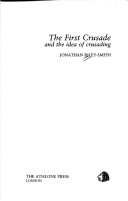Focusing on the inner-workings of the First Crusade in a way that no other work has done, The First Crusade and the Idea of Crusading delves into the Crusade's organization, its finances, and the division of authority and responsibility among its leaders and their relationships with one another and with their subordinates.
In the year 1095, Pope Urban II initiated what is known today as the First Crusade. Following what was then conventional practice among church reformers, the Pope referred to his war of liberation as Christ's own war, to be fought in accordance with God's will and intentions.
Urban II called this a war of liberation for two reasons: one, to free the church of Jerusalem from oppression and pillage by the Muslims and to liberate western churches in general; and two, to free the city of Jerusalem from the servitude into which it has fallen. This summons of the lay knight to the faith between 1095 and 1096 was Urban II's personal response to an appeal that had reached him from eastern Christians.
In this classic work, Jonathan Riley-Smith, today one of the world's most renowned crusade historians, approaches this central and well-known topic of medieval history with freshness and impeccable research. Through the vivid presentation of a wide range of European chronicles and charter collections, Riley-Smith provides a striking illumination of crusader motives and responses and a thoughtful analysis of the mechanisms that made this expedition successful.
- ISBN10 0485112914
- ISBN13 9780485112917
- Publish Date 26 May 1986
- Publish Status Out of Print
- Out of Print 17 February 1998
- Publish Country GB
- Publisher Bloomsbury Publishing PLC
- Imprint Continuum International Publishing Group Ltd.
- Format Hardcover
- Pages 224
- Language English
